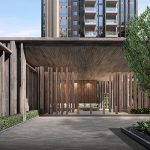Following Budget 2019, the various ministries debated on how they will be using their budget for 2019 in the Committee of Supply (COS) debate. Among the ministries, the Ministry of National Development COS debate is most closely followed because of its impact on homeownership in Singapore. Every new scheme or regulation change could have deep repercussions for Singaporeans. This year, the Ministry of National Development announced 4 new property rules that are aimed at helping Singaporeans achieve our dream of becoming homeowners. Here is a summary of the 4 new property rules which we think every Singaporean who dream of being a homeowner should know.

Image 1: Singapore Property Landscape And How New Property Rules Can Affect Singaporeans, Photo by Shawn Ang on Unsplash
4 New Property Rules That Will Affect Every Singaporean’s Homeownership Dream
-
New Property Rules 1: Shorter Waiting Time To Book Unsold Flats
Table of Contents
Existing Scheme: Currently, unsold HDB flats (or balance flats) are offered to Singaporeans through the Sale of Balance Flat (SBF) or Re-Offer of Balance Flats (ROF) exercise. Each exercise is conducted twice a year. After applying for a flat in the SBF/ROF exercise, you will need to wait for a week for the exercise to close before you can find out whether you are successful or not.
New Scheme: Instead of having an SBF/ROF exercise, unsold flats will be offered to Singaporeans on a rolling basis. You can book them anytime the moment they are released.
How Will This Affect Singaporeans?
Under the new scheme, you can find out within a day if your application is successful. This reduces the waiting time for booking a flat to just one day, instead of few months. For a start, the new scheme will be tested on a small batch of 120 flats in mid 2019. If the trial is successful, Singaporeans can expect this scheme to become a norm in the future when applying for balance flats.
-
New Property Rules 2: Shorter Balloting Time For BTO Projects
Existing Practice: BTO projects currently come with a balloting time of 6 weeks from the time the BTO application closes. This means that applicants will be spending 1.5 months waiting without actually knowing whether they will be successful or not.
New Practice: National Development Minister Lawrence Wong announced the BTO projects’ balloting time will be cut by half, from 6 weeks to 3 weeks.
How Will This Affect Singaporeans?
The shorter balloting time will allow Singaporeans to re-evaluate their housing choice without having to wait for an additional of 3 weeks. In conjunction with the new scheme to roll out unsold flats on a rolling basis, Singaporeans who are unsuccessful in their BTO application can switch to the rolling balance flat scheme.
-
New Property Rules 3: Expanded BTO Announcement Schedule Allow Singaporeans To See More BTO Projects
Existing Practice: Based on the existing practice, HDB will only release new projects 3 months in advance. This means that you can only find out about the upcoming BTO projects when the current one is released. For example, to find out about the BTO project in May, you will have to wait till February.
New Practice: The HDB will be announcing BTO projects 6 months in advance. Homeowners will be able to find out about the next 2 BTO projects at any point in time. In the May exercise, buyers will know which projects are launching in August and November.
How Will This Affect Singaporeans?
With the expanded BTO announcement schedule, Singaporeans will be able to view upcoming projects and make their plans accordingly. This will reduce the likelihood of Singaporeans balloting for not-so-ideal projects for fear of a lack of decent projects in the upcoming BTO. In short, more visibility means more choices for homeowners.
-
New Property Rules 4: Relaxed Restriction On CPF Usage For Older Flats
The issue of CPF usage on older flats (above 40 years) has been plaguing Singaporeans for a long time. After such a long time, the government has finally announced much needed changes to the CPF usage regulation.
Source: CPF
Existing CPF Regulation: Whenever a buyer purchases a flat with less than 60 years left on its lease, restrictions on the use of CPF funds will kick in. The amount of CPF that can be used is determined by the following formula:
| Remaining lease when youngest owner using CPF turns 55 | / | Remaining lease at point of purchase | x | Lower of purchase price or valuation of property |
Case Study: What Is The Problem With The Existing CPF Regulation?
The problem with the existing CPF regulation is best exemplified with a case study. Let’s say Mr Lee (30 years old) and Mrs Lee (32 years old) are looking for their dream home. They decided that they want to purchase a flat with remaining lease of 57 years at $600,000.
Property’s Remaining Lease: 57 years
Property purchase price: $600,000
Value of property: $550,000
Based on the existing CPF regulation, the couple can only use $309,000 from their CPF OA. The rest ($301,000) will have to be paid for by cash.
| 32 | / | 57 | x | $550,000 | = | ~$309,000 |
Unless you are a high earning couple with multiple years of savings, you will not be able to afford your HDB.
If you intend to be like Mr and Mrs Lee, you can check out CPF’s calculator to determine the maximum amount of CPF that you can use here (under the existing CPF regulation).
New CPF Regulation: While the new CPF regulation has not yet been finalized, Minister for National Development Lawrence Wong said that CPF usage rules will be relaxed. This will apply for flats with less than 60 years of lease. The formal announcement will be made in May 2019.
How Will This Affect Singaporeans?
In the coming years, a good proportion of HDB flats will be hitting the 40-year mark. The new regulation will create more liquidity for these older flats and allow Singaporeans with older flats to upgrade. At the same time, it will give Singaporeans more affordability if they have a preference for older flats in more mature estates.
Besides that, the banks are currently taking reference from CPF restrictions in assessing loan quantum. The relaxation of CPF usage on older flats will create a new benchmark for banks to reference, which could allow Singaporeans to get more access to home loans.
At iCompareLoan, we are able to help you compare home loan packages across all home loan providers in Singapore. Whether it is a HDB, condo or private property, we can help you find the best loan package based on your financial needs. You can also DIY on finding the best home loan here.






